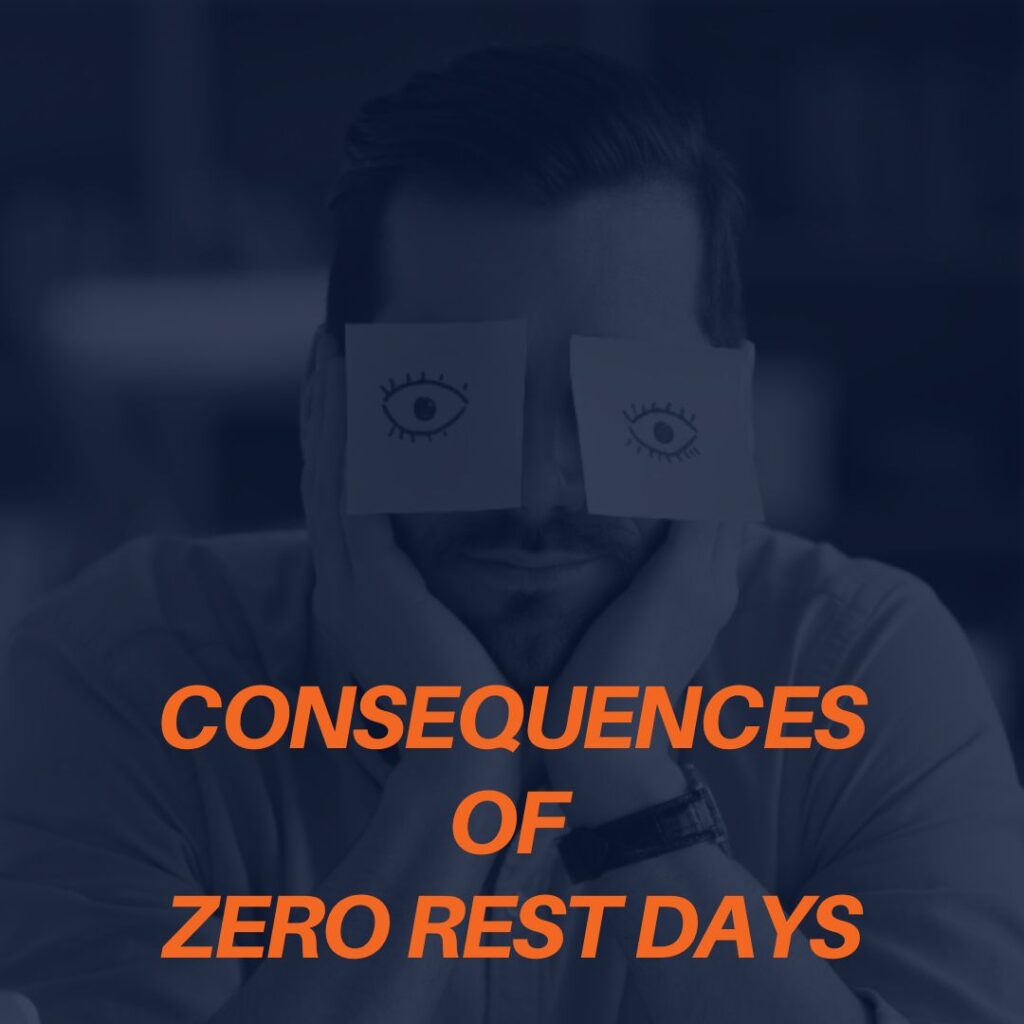Making progress is not about hustling all the time, never pressing pause, or having an infinite supply of willpower. In fact, this is the opposite of progress. It’s the grind that eventually stagnates progress and leads to mental and physical burnout. The truth is – rest days are massively underrated. Let’s examine some consequences of the take-no-rest mentality and how taking zero rest days can have an impact.
Hustle more. It’s about mental toughness. Be gritty and resilient. It’s about willpower and discipline. Does this sound familiar? These are common thoughts and shared statements from the fitfluencer, die-hard-never-stop-moving “fitness” fanatics that believe the key to physical achievement involves taking zero rest days. This thinking (and promotion of this thinking) is inherently flawed and places undue stress and pressure on consumers (and us) to be constantly moving and ignore the need to rest.
The Thing About Willpower
Willpower is not a virtue. It’s a mind-body response. Defined, willpower is the ability to ignore temporary discomfort or pleasure to pursue a long-term goal. It is, therefore, inherently limited and the longer we are asked to rely on willpower, the more it is diminished. Too often we see the insta-influencers and die-hard exercise fanatics talk about willpower as if we can both control it and refill it upon demand.
These “professionals” do not understand that anyone being asked to use willpower exclusively for an extended period of time or for multiple tasks will eventually burn out. Using willpower is relying on rationality; people make decisions based on emotion most often, as emotions are a far stronger driver for decision-making than rational thought or reason.
Results of Zero Rest Days
- Nervous system and endocrine fatigue: Exercise is a stress – a good stress – but there is a limit to how much stress the body can take. Eventually, that chronic stream of stress on the body will lead to nervous system fatigue, mineral depletion, and sleep issues. Further, adrenal fatigue can occur when the body overproduces cortisol, which is not an ideal outcome.
- Overuse injuries: Too little rest and too few days of recovery lead to injury. When the body is under constant pressure to perform, the joints, muscles, and connective tissues suffer. Individuals start to experience tendonitis, fasciitis, and other acute conditions that can turn to chronic issues.
- Waning interest in exercise: Dreading a workout or wondering why progress isn’t happening yet the workouts are hard, consistent, and daily? This happens because exercise not only taxes the body, but it also requires mental focus. When the body doesn’t get rest, the mind doesn’t either and that creates a spiral of disinterest and frustration when you’re putting in the work and not getting the desired results. It’s time to press pause and lean into some low-intensity steady-state exercise and restorative practices.
- Mental fatigue: Just as a reasonable amount of exercise offers an endorphin response, too much exercise has the opposite effect. An individual’s mood begins to suffer, and they experience irritability, moodiness, and their threshold for dealing with mental and emotional stress is diminished. The body and mind both suffer when overtraining is the motto.
- Decline in performance: Exercise depletes glycogen stores and breaks down muscle tissue. Without rest, there’s no recovery. Allowing adequate rest time promotes protein synthesis and restoration of glycogen stores – both of which are necessary for optimal performance and physical gains (i.e. progress).
- Constant and continuous soreness: Not listening to the body when it is asking for rest results in chronic pain and muscle soreness. When a client is sore, and sore every day, their performance will suffer, and they aren’t able to give their all in the workout where and when it’s needed. The result – a decline in fitness and a decreased quality of life.
It is easy for clients to become entrenched in the idea of “more work, the better the result”, but as scientists, we know this is not an accurate representation of how progress works. Progress exists on a continuum; there are conditions that support progress and conditions that detract from it and force the body into reverse.
Part of programming safe and effective exercise plans for clients is educating them about the necessity of rest and recovery as part of the journey to progress. Planning for recovery and integrating those rest days into a client’s program is creating the conditions that will support their desired progress.



